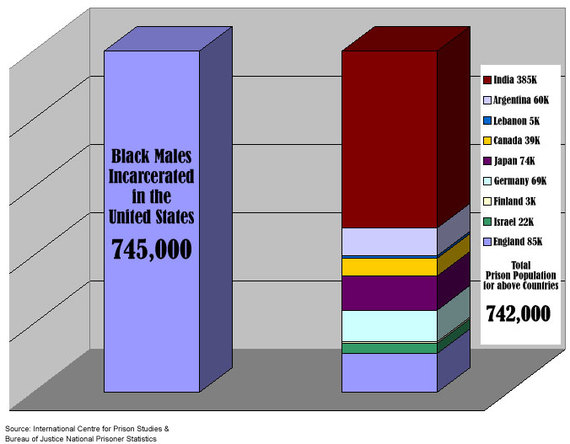
The Jodi Arias case has hung on sentencing and the underlying statement out of Arizona seems to be 'we don't give white women the death penalty.' But if not in this case then when would they do so? When would America find her crime to be heinous enough to be worthy of a death sentence?
As USA Today reports:
Arias has been in trial -- a sentencing retrial, actually -- since October... Thursday morning, they called it quits and Stephens declared a mistrial. Under Arizona law, Arias automatically will be sentenced by Stephens to life in prison. Arias' formal sentencing hearing has been scheduled for April. Stephens will decide whether she's eligible for release after 25 years.
Jodi Arias in effect may get out of prison, rather than die by lethal injection, because she was born a white woman. This is the consequence of inequity and mass incarceration. It skews our juries, and thus alters the process our nation relies upon for criminal justice.
The evidence stacked against Arias reaches to the ceiling, from admissions, to murder weapons, to a murder scene one might only find on a cable drama series. Twenty-seven stab wounds, a severed throat, and a gunshot to the head all pointed to an open and shut case. Yet we stood on the cusp of a verdict still wondering whether Arias should get the death penalty. As stated by CNN during commentary prior to the verdict "it is unusual for someone like Jodi Arias to even face the death penalty... could someone who looks like Jodi Arias be convicted 'to death' in the United States." What's unclear is whether this was a reference to her having the appearance of a white woman and facing these charges, or being a person who committed a horrific murder. Because given the above evidence taken in context, it is not at all that unusual for someone who shoots and stabs someone multiple times to face the death penalty.
Unlike Casey Anthony the Arias case is not a "whodunit." As said by defense attorney Mark Geragos on CNN, the only similarity between the two is "they both are attractive white women." We as a country have failed to properly deal with our historically-based systematic bias, which has exploded over the last 20 years due to mass incarceration, and in all too many ways affects our justice system. As I showed in my last piece, "The Black Male Incarceration Problem Is Real and It's Catastrophic," "there are more African American men incarcerated in the U.S. than the total prison populations in India, Argentina, Canada, Lebanon, Japan, Germany, Finland, Israel and England combined." Together the aforementioned nine countries represent more than 1.5 billion people; in comparison there are only around 18.5 million black males in the United States, counting children. 
Criminality has no color, but in America we have condensed criminality into a specific look. So we say things like, People who have a "SAFE" look usually don't face this or that type of punishment. Even if their crime leaves a scene that looks like a horror film, we still mark them as "safe" as we measure their guilt.
We do this instead of being honest and saying that people who look like criminals should, or will, likely be convicted -- with that supposed look of criminality far and away being embodied in the form of a young black male's face. There is a consequence for denying the impact of systemic inequity in punishment. What the prior mentioned statistics have done has affected our jury system by creating bias based on appearance. This bias affects plea deals, convictions and sentencing by undermining decisions of guilt and punishment being based solely on the actual facts of a specific case. This bias reaches across the country to the homes of people like Charles Ramsey, savior of Amanda Berry, who despite being saviors are characterized otherwise in private social circles due to their appearance. In Arizona on December 31, 1980, Murray Hooper, a black male, killed two victims while committing a heinous home robbery. He was sentenced to death; as a former prosecutor I believe he was sentenced properly given the case evidence.

But given his mug shot I have to wonder if Hooper (not an entertainer or an athlete but an unknown black male, just as Arias was unknown prior to the case) had been the subject in the Arias' case, would the trial have even been on primetime TV? If so, would it have even been questioned whether he would be sentenced to death by jury, as it is was with Arias, or would it just be presumed? That is for each of us to answer honestly in our own place of solace, hopefully before we are possibly faced with our own civic duty of judgment in a jury box.
